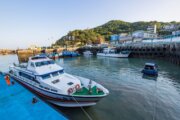aeeble
Blue Sail Port
886-836-89388
連江縣莒光鄉青帆港
Alfalfa Bay, a key gateway to Shidu Island and an important entry point to Western Lü Island, is located along the southern coast of Western Lü Island, serving as a crucial access point for the island and the administrative center of Jurong Township. Originally named "QingFan," the name is said to have originated from the presence of foreigners who once lived there. Perched on a hillside with a spectacular view, QingFan Village offers an expansive sea vista and blends white hillside architecture with a deep blue sky, evoking the atmosphere of the Mediterranean.
Spanning about 134 hectares, QingFan Village serves as a commercial hub, settlement, and port, and is the most vibrant village on Western Lü Island. During the late Qing dynasty, it was the only area in the Matsu Islands declared a "town," with foreign and domestic steamships stopping at its bay to wait for the tide before proceeding into Fujian’s Min River for supplies. Trade thrived, and the village was named "Little Hong Kong" due to its bustling activity. At its peak, it also included Qingdong and Qingxi neighborhoods and continues to be Jurong's busiest market; local businesses, markets, restaurants, and government offices are all concentrated in this area.
Wandering among the village houses and reading slogans along stone walls and stairs evoke the past. Old mansions, now modest, are surrounded by modern buildings; fishing lanes are locked and silent, the vivid memories of the village’s fishing heyday faded into a hazy past. The national emblem on the doorpost of an aging home laments the passing of time. The Queen of Heaven Temple of QingFan is located above the old street, while the Valiant Chen Yuan Shuai Temple is situated near the port and serves as the local as well as the island-wide center of religious devotion, enjoying great popularity and fervent worship.
The West Company of the U.S. CIA and the "Mountain and Sea Family"
In the late 1920s, pro-Japanese forces associated with the "Second Road of the Peace-Saving Army," functioning as a proxy, occupied the area. By the late 1930s, Dong Hai (Eastern Sea) forces moved in, with its headquarters established in "Mountain and Sea Family." In the early 1940s, during the Korean War, the U.S. CIA set up an intelligence operation in QingFan under the name of the "Western Company," and the U.S. flag, the Stars and Stripes, flew for a while at the "Mountain and Sea Family" property in QingFan Village. This period endowed the port with a rich heritage of human culture and history, echoing the local narrative.
Valiant Chen Yuan Shuai Temple – the Center of QingFan’s Devotion
The Temple of Valiant Chen Yuan Shuai on Western Lü Island reflects a unique local belief tradition. Originally named Chen Shangming, the Valiant Chen Brother was known for his willingness to stand up for justice. After his death, his body floated with the waves and drifted into QingFan Bay, where it remained for three days without being swept away. The villagers, intrigued, made a vow that if they returned from fishing with a full catch, they would properly bury his remains. The vow was fulfilled, and the villagers became even more curious. They vowed again that if they caught a headless yellow fish, they would build a temple in his honor. The vow was again fulfilled, and to this day, the villagers maintain the temple to honor their devotion.
Images
Ratings
Related Lists
🖼️

🖼️

🖼️
🖼️
🖼️


Comments